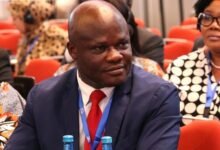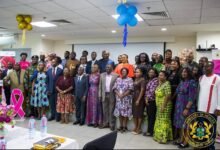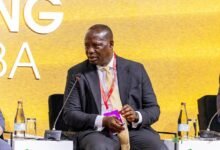UCC begins Ph.D. programme for 43 health personnel

The University of Cape Coast (UCC) has begun a Doctor of Philosophy (PhD) programme for 43 health personnel towards improving the capacity of members of health training institutions in the country.
Three study centres namely, Accra, Kumasi and Tamale, are currently serving as the venue for the training of the first batch of students under the programme.

Additionally, a total of 213 cadet officers of the Ghana Police Service have also been admitted to pursue academic programmes in peace and security studies at the Police Academy.
The Pro-Vice Chancellor of UCC, Prof.Mrs Rosemond Boohene, announced these at a matriculation ceremony for students under the College of Distance Education (CoDE).
A total of 9,168 other students comprising undergraduate and post-graduate students were also matriculated during the ceremony to pursue various degrees in business and education programmes.
Prof. Boohene explained that the PhD programme was as a result of appeal from the Conference of Heads of Health Training Institutions (COHHETI) through their President for Health related PhD programmes for its members.
“After series of engagements between the Committee on Institutional Affiliation and School of Graduate Studies, Department of Population and Health and the Department of Health Physical Education and Recreation, approval was given for the commencement of the programme in April, 2022,” she indicated.
The university, she said, would continue to introduce other health related programmes through engagement with key stakeholders in the health sector to train competent human resource base for the sector.
Prof.Boohene explained, would boost quality healthcare delivery in the country and also ensure universal health coverage for all Ghanaians, saying, “In the coming years we intend to expand the programmes to enable every qualified health personnel to benefit.”
On the learning programme at the Police Academy, she said the University had taken the lead towards supporting the efforts of the Police Administration in upscaling training of police personnel and improving standards of service delivery.
“With the increase in threat to global peace and security, the international community including Ghana is increasingly being challenged to improve upon security abilities and to articulate good security policies,” she said.
Prof.Boohene explained that, although the police service had chalked a lot of successes in combatting crime over the years, there is still the need for further training to counter the frontiers in criminality.
“Globally, there is an increasing realisation that while the traditional police training styles served us well, it is inadequate to meet the changing nature of crime and global developments in terrorism and counterintelligence operations” she said.
She indicated that: “The curriculum is premised on the philosophy that police training is more effective when professional skills and tactical training are combined with academic and intellectual education.”
She urged the students to study hard and also adhere to the rules and regulations outlined in these books as well as other rules existing in the University.
“We expect that you attend lectures regularly to tap knowledge from the pool of Professors, Senior Lecturers and Lecturers and Research fellows. Take all academic exercises seriously because they all contribute to your overall mark. If you learn hard, the urge to engage in examination malpractice will not be there.
From David O. Yarboi-Tetteh, Cape Coast







